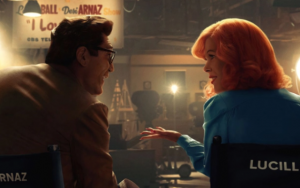BEING THE RICARDOS: 3 ½ STARS. “about character not caricature.”
 “Being the Ricardos,” the new Aaron Sorkin directed look at the most famous television couple of the 1950s, in theaters this weekend and on Prime Video December 21, is a character study that examines one very bad week on the sitcom set of “I Love Lucy.”
“Being the Ricardos,” the new Aaron Sorkin directed look at the most famous television couple of the 1950s, in theaters this weekend and on Prime Video December 21, is a character study that examines one very bad week on the sitcom set of “I Love Lucy.”
In 1953 “I Love Lucy” was watched by 60 million people a week. The show was so popular that department stores had to change their hours. The big box stores used to stay open late on Mondays but switched to Thursdays because no one shopped on Monday nights while Lucy, Desi, Fred and Ethel were on.
Real life couple Lucille Ball and Desi Arnaz, played in the film by Nicole Kidman and Javier Bardem, are television’s biggest stars as they prepare to shoot episode four of their second season. Tension hangs heavy over the set, the result of two news stories about the couple.
First is Confidential Magazine, a sleazy tabloid that specializes in scandal and exposé journalism, who accuses Desi of having an affair in a lurid article titled “Desi’s Wild Night Out.” More damningly, another report suggests Lucy is a communist, under investigation by the FBI and the House Un-American Activities Committee.
The accusation against Desi causes trouble at home but even a whiff of communism around Lucy could lead to a stink that could ruin both their careers. The Hollywood blacklist looms.
“You and me have been through worse than this,” Desi says reassuringly.
“Have we?” she asks.
“No.”
Set up like a pseudo-documentary, modern day talking heads keep the story moving forward while flashbacks flesh out the action. We learn about how the couple met, their volatile relationship—”They were either tearing each other’s clothes off,” says writer Madelyn Pugh (Linda Lavin), “or tearing one another’s heads off.”—and how the show and Lucy’s perfectionism are more than just a professional concern. “I Love Lucy” was the glue that held her marriage together, especially during troubled times.
It can be tricky portraying familiar figures on screen. Through endless re-runs Lucille Ball’s face and comedy are iconic, but Kidman and Bardem, wisely chose not to do imitations of the stars. They have the mannerisms and a passing resemblance to Lucy and Desi but this is about character not caricature. For the most part this is a backstage drama, and wisely stays away from restaging scenes from “I Love Lucy” that are burned into people’s imaginations. What we get instead are interpretations of these characters that corral their collective charisma, hot tempers and talent.
What emerges is a scattershot portrait of fame, creative control and the power of the press. Sorkin juggles a lot of moving parts, but by the time the end credits roll it’s difficult to know exactly what point he is trying to make. Ball is given the credit she deserves as a trailblazer and Arnaz’s business acumen is celebrated, but the other, colliding plot points feel cobbled together. Any one of them—the communism scare, Desi’s alleged infidelity, Lucy’s pregnancy or the cast in-fighting—could have sufficed as a compelling backdrop to the Lucy and Desi story. Instead, the movie feels overstuffed.
“Being the Ricardos” does justice to the legacy of its subjects, and features pages of Sorkin’s trademarked snappy dialogue, but splinters off in too many directions to be truly effective.
